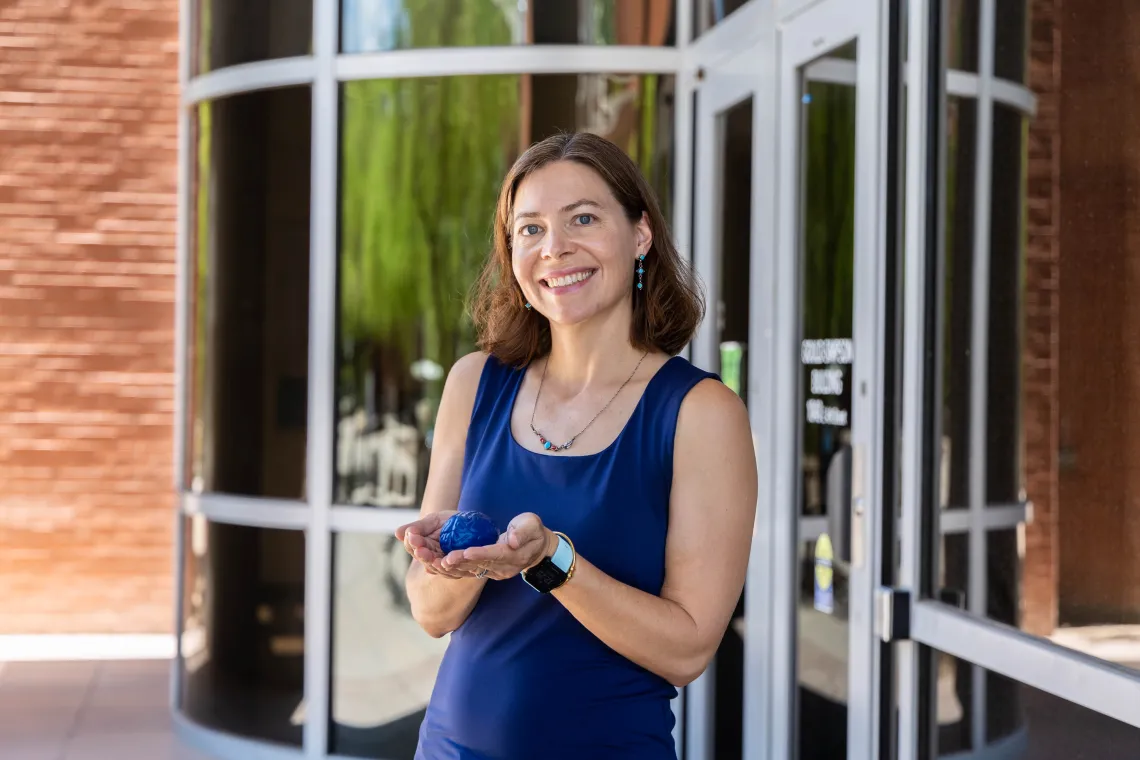Martha Bhattacharya receives NSF CAREER Award to explore neuron-glia communication following nerve injury

Dr. Martha Bhattacharya, Associate Professor of Neuroscience (Photo credit: Molly Condit / Great Bear Media)
Dr. Martha Bhattacharya, Assistant Professor in the Department of Neuroscience at UArizona, received the Faculty Early Career Development (CAREER) Award from the National Science Foundation (NSF), the foundation’s most prestigious honor for junior faculty members. She will receive $1.1 million of funding over five years from the NSF's Division of Integrative Organismal Systems.
Bhattacharya's research focuses on the molecular pathways involved in the degeneration of axons, the threadlike cell structures that are critical for neuronal communication. The overarching mission of the Bhattacharya Laboratory is to discover genetic and cell biological pathways that contribute to neuronal dysfunction during injury and disease.
Glial responses to neuronal injury are a critical determinant of neuronal survival in inflammatory and neurodegenerative disorders. Therefore, determining how glia promote neuronal health and identifying ways to enhance beneficial versus detrimental effects of glial activation is a compelling need. Recent studies have established transfer of mitochondria (mitoTCT) between neurons and glia as a key element of their communication that can have both positive or negative consequences for neurons, depending on the state of the mitochondria.
As scientists have very limited knowledge about the mechanisms, regulation, or consequences of mitoTCT in the brain, Bhattacharya's goal is to discover the mechanisms regulating mitoTCT in vivo using an innovative combinatorial strategy of genetics, 3D microscopy, and imaging flow cytometry in the Drosophila (fruit fly) nervous system.
“I am very grateful to the National Science Foundation for supporting our work. My lab is excited to launch these new research directions that will illuminate ways to ensure neuronal health through a lifetime," said Bhattacharya.
In tandem with these research efforts, the funding will expand opportunities for undergraduate research participation through a Vertically Integrated Project (VIP) course in neuron-glial communication using Drosophila. Students will have the opportunity to participate in a team-based, credit-bearing neuroscience research project for three consecutive semesters. Through her VIP course, which began in 2021, Bhattacharya has initiated a substantial broadening of opportunities for undergraduate students in the College of Science to gain research experience, and she now serves as the Faculty Director of the VIP program at UArizona.
"I’m thrilled that this award will enable more participation in research by undergraduates across multiple scientific disciplines, giving them an opportunity to do real discovery work," Bhattacharya said. "I’ve seen how impactful this course is for my current undergrads – who are getting admitted to very competitive summer programs and PhD programs across the country – and it makes me so happy to see their success!”
The CAREER funding will also expand outreach to elementary and middle school students through a partnership with SARSEF (Southern Arizona Science and Engineering Foundation).
Bhattacharya has won numerous awards for her innovative college teaching methods, including the 2021 University of Arizona College of Science’s Distinguished Early-Career Teaching Award, as well as the university-wide Five Star Faculty Award in 2022.
"Dr. Bhattacharya’s CAREER Award is thrilling and extraordinary since it will allow her to advance both creative research and education in the Department of Neuroscience," said Dr. Konrad Zinsmaier, Professor and Department Head of Neuroscience at UArizona. "On one side, she will be able to dissect the mechanisms underlying a fundamentally novel concept of how brain cells communicate with each other. On the other side, she will substantially boost undergraduate education in the Neuroscience and Cognitive Science program by expanding her pioneering VIP course in neuron-glial communication. Obtaining this CAREER Award is a well-deserved honor for Dr. Bhattacharya, who is both an exceptional researcher and educator, and an inspiration to all of us!"
Learn more about the Bhattacharya Lab here.

